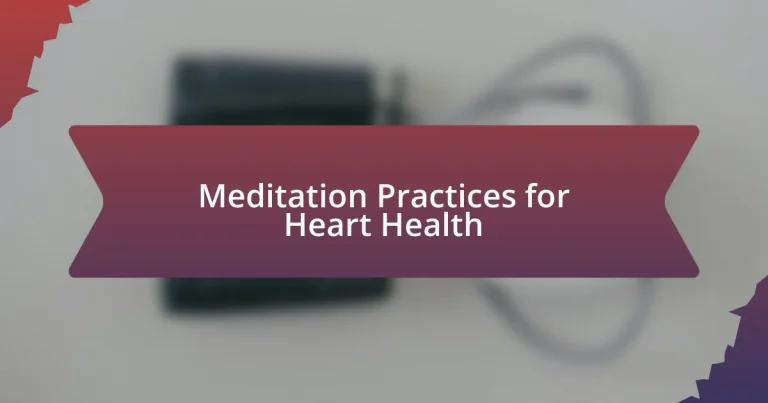Meditation practices for heart health encompass techniques such as mindfulness meditation, loving-kindness meditation, and transcendental meditation, all of which have been shown to reduce stress and lower blood pressure, critical factors for cardiovascular well-being. Research indicates that regular meditation can lead to significant improvements in heart rate variability and reductions in hypertension, thereby enhancing overall heart health. The article explores the physiological changes that occur during meditation, the impact of stress reduction on cardiovascular risk, and the importance of consistency in practice. Additionally, it provides practical tips for incorporating meditation into daily routines and addresses common challenges faced by practitioners.

What are Meditation Practices for Heart Health?
Meditation practices for heart health include mindfulness meditation, loving-kindness meditation, and transcendental meditation. Mindfulness meditation has been shown to reduce stress and lower blood pressure, which are critical factors for heart health. A study published in the Journal of the American College of Cardiology found that mindfulness meditation can lead to significant reductions in blood pressure and improvements in heart rate variability. Loving-kindness meditation promotes positive emotions and social connections, which can enhance emotional well-being and reduce cardiovascular risk. Transcendental meditation, practiced for 15-20 minutes twice daily, has been associated with decreased anxiety and improved heart health, as evidenced by research from the American Heart Association indicating lower rates of heart disease among practitioners.
How do meditation practices impact heart health?
Meditation practices positively impact heart health by reducing stress and lowering blood pressure. Research indicates that regular meditation can lead to significant reductions in heart rate and blood pressure, which are critical factors in cardiovascular health. A study published in the journal Circulation in 2012 found that mindfulness meditation can decrease blood pressure in individuals with hypertension, demonstrating a direct link between meditation and improved heart health outcomes. Additionally, meditation promotes relaxation and emotional well-being, which further contributes to cardiovascular benefits by mitigating stress-related heart issues.
What physiological changes occur in the heart during meditation?
During meditation, the heart experiences several physiological changes, including a decrease in heart rate and blood pressure. These changes occur due to the activation of the parasympathetic nervous system, which promotes relaxation and reduces stress. Research indicates that regular meditation can lead to improved heart rate variability, reflecting better autonomic regulation of the heart. A study published in the Journal of the American College of Cardiology found that individuals who practiced meditation showed significant reductions in systolic and diastolic blood pressure compared to non-meditators, highlighting the cardiovascular benefits of this practice.
How does meditation influence stress levels related to heart health?
Meditation significantly reduces stress levels, which positively impacts heart health. Research indicates that regular meditation practice lowers cortisol levels, a hormone associated with stress, thereby decreasing the risk of heart disease. A study published in the Journal of the American College of Cardiology found that mindfulness meditation can lead to lower blood pressure and improved heart rate variability, both indicators of better cardiovascular health. Furthermore, the American Heart Association recognizes meditation as a beneficial practice for managing stress and promoting overall heart health.
What types of meditation are beneficial for heart health?
Mindfulness meditation and transcendental meditation are beneficial for heart health. Mindfulness meditation reduces stress and anxiety, which are risk factors for heart disease, by promoting relaxation and emotional regulation. Studies have shown that individuals practicing mindfulness meditation experience lower blood pressure and improved heart rate variability. Transcendental meditation, characterized by the use of a mantra, has been linked to reduced blood pressure and decreased levels of stress hormones. Research published in the American Journal of Cardiology found that participants practicing transcendental meditation had a significant reduction in cardiovascular risk factors, including hypertension.
What is mindfulness meditation and how does it help the heart?
Mindfulness meditation is a practice that involves focusing attention on the present moment while calmly acknowledging and accepting one’s thoughts, feelings, and bodily sensations. This practice helps the heart by reducing stress and anxiety, which are known risk factors for cardiovascular disease. Research published in the journal “Circulation” indicates that mindfulness meditation can lower blood pressure and improve heart rate variability, both of which are beneficial for heart health. Additionally, a study by the American Heart Association found that individuals who engage in mindfulness meditation experience lower levels of cortisol, a stress hormone that can negatively impact heart health.
How does loving-kindness meditation contribute to cardiovascular well-being?
Loving-kindness meditation contributes to cardiovascular well-being by reducing stress and promoting positive emotions, which can lead to lower blood pressure and improved heart health. Research indicates that individuals who practice loving-kindness meditation experience increased feelings of compassion and social connection, which are associated with better cardiovascular outcomes. A study published in the journal “Psychosomatic Medicine” found that participants who engaged in loving-kindness meditation showed significant reductions in blood pressure and heart rate, demonstrating the meditation’s effectiveness in enhancing cardiovascular health.
Why is consistency important in meditation for heart health?
Consistency in meditation is crucial for heart health because regular practice leads to sustained reductions in stress and improvements in emotional well-being. Research indicates that consistent meditation can lower blood pressure, reduce heart rate, and enhance overall cardiovascular function. For instance, a study published in the Journal of the American College of Cardiology found that individuals who practiced meditation regularly experienced significant improvements in heart health markers compared to those who did not meditate. This evidence underscores the importance of maintaining a consistent meditation routine to achieve long-term benefits for heart health.
How often should one meditate to see heart health benefits?
To see heart health benefits, one should meditate regularly, ideally for at least 20 to 30 minutes a day, five times a week. Research indicates that consistent meditation can lead to lower blood pressure, reduced stress levels, and improved heart rate variability, all of which contribute to better cardiovascular health. A study published in the Journal of the American College of Cardiology found that participants who engaged in mindfulness meditation experienced significant reductions in blood pressure and heart rate over an eight-week period. Thus, regular meditation practice is essential for maximizing heart health benefits.
What are the long-term effects of regular meditation on heart health?
Regular meditation has been shown to significantly improve heart health over the long term. Studies indicate that consistent meditation practice can lead to lower blood pressure, reduced heart rate, and improved overall cardiovascular function. For instance, research published in the Journal of the American College of Cardiology found that mindfulness meditation can decrease blood pressure by promoting relaxation and reducing stress, which are key factors in heart disease. Additionally, a meta-analysis in the journal Circulation: Cardiovascular Quality and Outcomes highlighted that meditation practices are associated with a lower risk of heart attack and stroke, further supporting the positive impact of meditation on heart health.
How can one start incorporating meditation into their heart health routine?
To start incorporating meditation into a heart health routine, one should begin with short, focused sessions of mindfulness or breathing exercises for 5 to 10 minutes daily. Research indicates that regular meditation can lower blood pressure and reduce stress, both of which are beneficial for heart health. A study published in the Journal of the American College of Cardiology found that mindfulness meditation can significantly improve cardiovascular health by reducing anxiety and promoting relaxation. Gradually increasing the duration and frequency of meditation sessions can further enhance these benefits.
What are some beginner-friendly meditation techniques for heart health?
Beginner-friendly meditation techniques for heart health include mindfulness meditation, loving-kindness meditation, and guided imagery. Mindfulness meditation involves focusing on the present moment and observing thoughts and feelings without judgment, which can reduce stress and lower blood pressure. Loving-kindness meditation encourages practitioners to cultivate feelings of compassion and love towards themselves and others, promoting emotional well-being and reducing anxiety, both of which are beneficial for heart health. Guided imagery uses visualization techniques to create calming mental images, helping to lower heart rate and promote relaxation. Research indicates that regular practice of these techniques can lead to improved cardiovascular health by reducing stress and enhancing emotional resilience.
How can one create a conducive environment for heart-focused meditation?
To create a conducive environment for heart-focused meditation, one should ensure a quiet, comfortable space free from distractions. This environment should include soft lighting, comfortable seating, and calming elements such as plants or soothing colors, which promote relaxation and focus. Research indicates that a serene atmosphere can enhance mindfulness practices, leading to improved emotional regulation and heart health. For instance, a study published in the Journal of Alternative and Complementary Medicine found that participants who meditated in a tranquil setting reported lower stress levels and improved cardiovascular function.
What are the common challenges faced in meditation for heart health?
Common challenges faced in meditation for heart health include difficulty in maintaining focus, physical discomfort, and emotional resistance. Individuals often struggle to keep their minds from wandering, which can hinder the effectiveness of meditation in promoting heart health. Research indicates that distractions can lead to increased stress levels, counteracting the benefits of meditation. Additionally, physical discomfort, such as pain from prolonged sitting, can deter individuals from practicing regularly. Emotional resistance, including anxiety or frustration about the practice, can also impede progress. A study published in the Journal of the American College of Cardiology found that consistent meditation practice can lower blood pressure and improve heart health, but overcoming these challenges is essential for achieving those benefits.
How can distractions be minimized during meditation sessions?
Distractions during meditation sessions can be minimized by creating a dedicated, quiet space for practice. This environment should be free from noise, interruptions, and visual distractions, which has been shown to enhance focus and deepen meditation experiences. Research indicates that a controlled environment significantly improves the ability to concentrate, as evidenced by a study published in the Journal of Mindfulness, which found that participants in distraction-free settings reported higher levels of mindfulness and satisfaction during meditation. Additionally, using techniques such as guided meditations or focusing on breath can further help in maintaining attention and reducing the likelihood of distractions.
What strategies can help maintain motivation for regular meditation practice?
To maintain motivation for regular meditation practice, setting specific goals and establishing a consistent routine are essential strategies. Research indicates that individuals who set clear, achievable goals are more likely to adhere to their meditation practices, as it provides a sense of direction and purpose. Additionally, creating a designated time and space for meditation helps to reinforce the habit, making it easier to integrate into daily life. A study published in the Journal of Health Psychology found that participants who practiced meditation regularly reported higher levels of motivation when they had a structured schedule. Engaging with a community or meditation group can also enhance motivation, as social support and shared experiences encourage commitment to the practice.
What practical tips can enhance meditation practices for heart health?
To enhance meditation practices for heart health, individuals should incorporate techniques such as focused breathing, mindfulness, and regular practice duration. Focused breathing, which involves deep, slow breaths, can lower heart rate and reduce stress, contributing to cardiovascular health. Mindfulness meditation, where one remains present and aware of thoughts and feelings without judgment, has been shown to decrease blood pressure and improve heart function. Additionally, committing to a regular meditation schedule, ideally 20-30 minutes daily, can lead to sustained benefits for heart health, as consistent practice has been linked to lower levels of cortisol, the stress hormone that negatively impacts heart health. Studies indicate that mindfulness meditation can reduce the risk of heart disease by improving emotional regulation and decreasing anxiety, which are crucial for maintaining a healthy heart.





